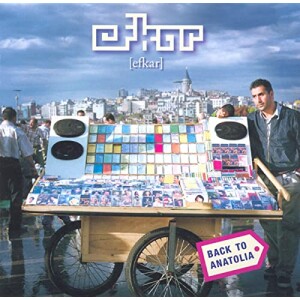 Efkar is a six-person ensemble, featuring two female vocalists, as well as four men who play various traditional percussion, string and wind instruments. One of the vocalists, Sabahat Akkiraz, has six solo CDs to her credit. It looks as though all the men have played with Kurdish singing legend Sivan Perwar. Flutist Ismet Demirhan also plays with a Swedish band called In the Labyrinth. Percussionist Hakan Vreskala shows up with Superstar Orkestar, another Swedish band. It looks like most of them also play at weddings and festivals.
Efkar is a six-person ensemble, featuring two female vocalists, as well as four men who play various traditional percussion, string and wind instruments. One of the vocalists, Sabahat Akkiraz, has six solo CDs to her credit. It looks as though all the men have played with Kurdish singing legend Sivan Perwar. Flutist Ismet Demirhan also plays with a Swedish band called In the Labyrinth. Percussionist Hakan Vreskala shows up with Superstar Orkestar, another Swedish band. It looks like most of them also play at weddings and festivals.
All but one of these performers appear to be from Anatolia, the peninsula that comprises the modern Turkish nation-state, although most are living in Europe now. For these artists, playing this music is a way to stay rooted in their traditions, and a way to share those memories with others. In fact, the band’s name Efkar translates as ‘thoughts’ or ‘ideas turning around in your mind.’
With 11 longish tracks, the CD has a run time of just under an hour. All but one of the pieces are traditional. The tracks offer a nice mixture of instrumentals and vocals. Quite a few of them are arranged as medleys. Most of the uptempo pieces are dance tunes, played in rhythms that may seem unusual to many Westerners. The slower pieces typically include vocals. Based on the thumbnail descriptions in the liner notes, it looks like most of them are about death or love gone wrong. I would describe them as ‘haunting’ or even ‘bluesy,’ if I can use that adjective to characterize a mood rather than a genre.
The thumbnails also include information on the places in Anatolia where the tunes or songs originated. Two were from the city of Diyarbakir in the southeast part of Turkey, often known as Turkish Kurdistan. Most of the other places are literally all over the peninsula. What they have in common is that they are all relatively small places, so this is village music rather than city music.
The opening track, ‘Anadolu,’ is an eight-minute medley of dance tunes from three villages in different parts of Eastern Turkey, played primarily on string instruments. The first two are slow and haunting, while the final tune in the set speeds up to a fast 7/8 time. Track two, ‘Fincanin Etrafi,’ features one of the vocalists, I think Yasemin Dinc, telling a tale about a man who feels his love is causing him to fade away like the painted decorations on Turkish coffee cups. This is one of the songs from Diyarbakir. The third track, ‘Abdal Olsam’, features the other vocalist (the liner notes don’t tell who sings on what, but I think this is Sabahat) with a song from the ancient village of Zile in the Tokat region (east of Ankara and not far south of the Black Sea) that segues into a piece from a religious ceremony in the Alevi tradition. The Alevis, one of several ethnic minorities in Turkey, practice a religion that contains elements Shi’a Islam blended with ancient Turkic shamanism.
‘Serenier Zeybegi’ is an instrumental, this one from Burdur in southwest Turkey, not far from the port of Antalya. The fifth track ‘Arix’ is another instrumental, long and bluesy, a requiem from Sivas (not far from Zile) commemorating the deaths of many children during an earthquake that happened in the nearby town of Erzincan in 1939. The mood changes dramatically on the next track ‘Dibeban ustundeyim – Vur Davulcu’, a very upbeat wedding jam that changes tempo from 6/8 to 2/4 — a nice challenge for the percussionist, not to mention the dancers!
I experience track seven ‘Sad Olup Gulmedim’ as another form of blues, a song in which a woman expresses her sorrow at being far from her village and her lover. The mood shifts again on ‘Al Yazma Zeybegi’, which features the same vocalist (at least I can tell them apart!) as a wife complaining about her husband staying out at night instead of coming home to her. This one is quite a bit more upbeat than the previous one, suggesting that the woman is perhaps more angry than sad.
The final three tracks return to instrumentals. Nine is a darbuka (hand drum) solo, written and performed by Hakan Vreskala, whose thumbnail bio says he began as a punk drummer in Izmir and plays in several bands. It’s the only non-traditional piece on the whole CD. ‘Bahcada Yesil Cinar’ is another long, downtempo tune, again from Diyarbakir, about a pair of star-crossed lovers. This piece closes with a lovely solo on a flute-like instrument called a kaval. ‘Tamzara’ returns to a more upbeat mode with a dance tune from Erzurum in Eastern Turkey.
Given that the members of Efkar don’t live in close proximity and that most of them have other musical projects, it will be interesting to see if they manage to reprise this memorable debut effort. I hope they do!
(Caprice, 2006)
